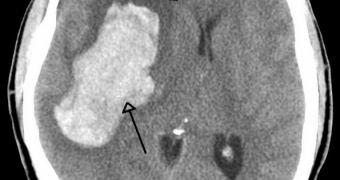People who are more impatient, aggressive and quick-tempered than their peers are at a higher risk of suffering from a stroke, Spanish researchers argue in a new study. All these traits are collectively known as a type A personality. The research suggests a similar risk is present in overly stressed people.
What this finding implies is that taking a more laid-back approach to handling life issues may promote your health in the long run. Spending most of your time getting angry, or being stressed, will eventually get to you in a variety of ways, including stroke.
The research was carried out by investigators at the Hospital Clinico Universitario San Carlos, in Madrid, Spain, who were led by scientists Ana Maria Garcia, MD. Details of the study have been published in the latest issue of the scientific Journal of Neurology, Neurosurgery and Psychiatry.
Experts were able to determine that chronic stress increases a person's chance of suffering from a stroke by 400 percent, a significant boost over the risk level affecting the general population. In addition, stress is also known to boost heart attack risks.
“Our findings indicate that people can lower their stroke risk by attempting to reduce the stress in their lives,” Garcia explains. She adds that the new investigation was conducted on 150 stroke patients, and 300 healthy individuals, PsychCentral reports.
The average age of all test participants was 54, the team says, which is way below the average age of stoke victims. The reason why a younger population group was selected is because it's easier to study the effects of stress on health in adults, rather than in seniors.
In addition to a type A personality and stress, other risk factors for stroke include high blood pressure, high cholesterol, obesity, diabetes, artery disease, heart disease and smoking, among others.
“This study gives us another reason to counsel patients with these risk factors to try and reduce the stress in their lives,” says Rafael Ortiz, MD, who is a specialist in stroke studies.
He holds an appointment as the director of the Center for Stroke and Neuro-Endovascular Surgery at the Lenox Hill Hospital, in New York City.
The research group was also able to determine that sleep apnea (the collapse of superior airways during sleep), excessive daytime sleepiness and heart rhythm disorders also boosted a person's chances of suffering a stroke.

 14 DAY TRIAL //
14 DAY TRIAL //